小学英语一般疑问句和特殊疑问句知识精讲
- 格式:doc
- 大小:58.50 KB
- 文档页数:7
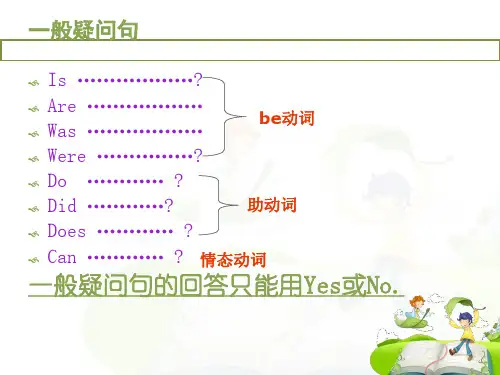
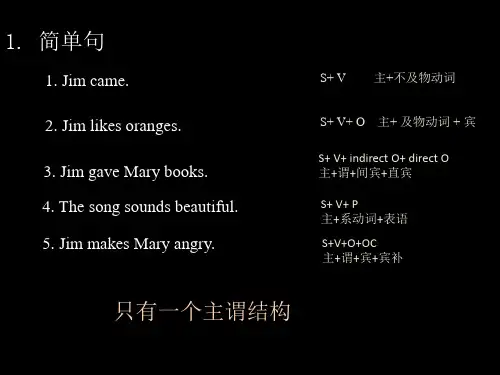
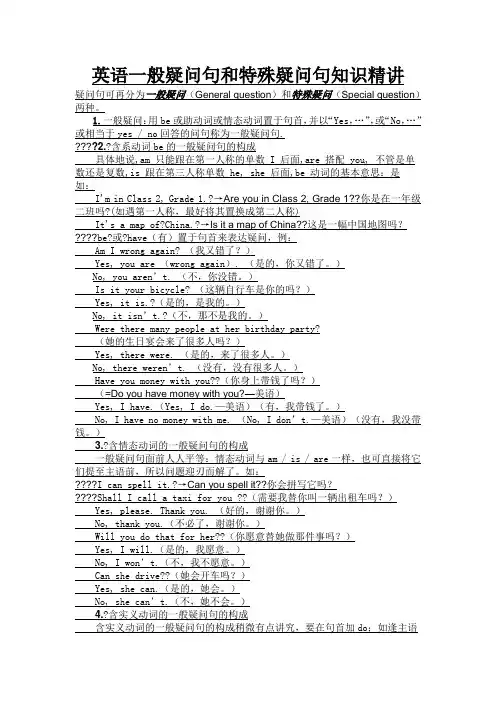
英语一般疑问句和特殊疑问句知识精讲疑问句可再分为一般疑问(General question)和特殊疑问(Special question)两种。
1.一般疑问:用be或助动词或情态动词置于句首,并以“Yes,…”,或“No,…”或相当于yes / no回答的问句称为一般疑问句.????2.?含系动词be的一般疑问句的构成具体地说,am 只能跟在第一人称的单数 I 后面,are 搭配 you, 不管是单数还是复数,is 跟在第三人称单数 he, she 后面,be 动词的基本意思:是如:I'm in Class 2, Grade 1.?→Are you in Class 2, Grade 1??你是在一年级二班吗?(如遇第一人称,最好将其置换成第二人称)It's a map of?China.?→Is it a map of China??这是一幅中国地图吗?????be?或?have(有)置于句首来表达疑问,例:Am I wrong again? (我又错了?)Yes, you are (wrong again). (是的,你又错了。
)No, you aren’t. (不,你没错。
)Is it your bicycle? (这辆自行车是你的吗?)Yes, it is.?(是的,是我的。
)No, it isn’t.?(不,那不是我的。
)Were there many people at her birthday party?(她的生日宴会来了很多人吗?)Yes, there were. (是的,来了很多人。
)No, there weren’t. (没有,没有很多人。
)Have you money with you??(你身上带钱了吗?)(=Do you have money with you?—美语)Yes, I have.(Yes, I do.—美语)(有,我带钱了。
)No, I have no money with me. (No, I don’t.—美语)(没有,我没带钱。
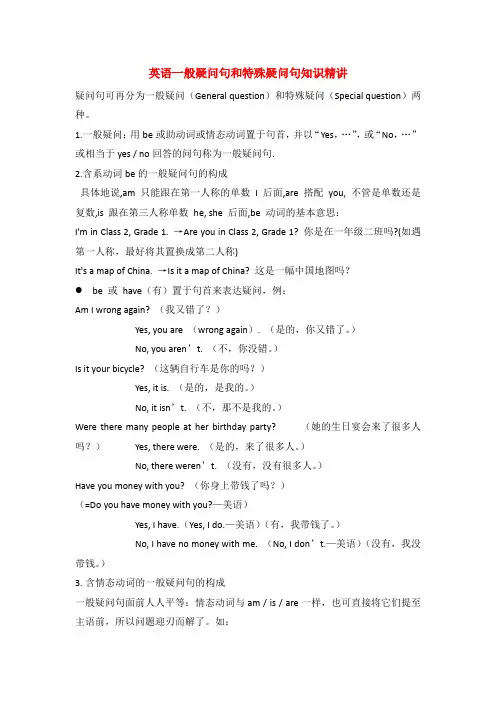
英语一般疑问句和特殊疑问句知识精讲疑问句可再分为一般疑问(General question)和特殊疑问(Special question)两种。
1.一般疑问:用be或助动词或情态动词置于句首,并以“Yes,…”,或“No,…”或相当于yes / no回答的问句称为一般疑问句.2.含系动词be的一般疑问句的构成具体地说,am 只能跟在第一人称的单数I 后面,are 搭配you, 不管是单数还是复数,is 跟在第三人称单数he, she 后面,be 动词的基本意思:I'm in Class 2, Grade 1. →Are you in Class 2, Grade 1? 你是在一年级二班吗?(如遇第一人称,最好将其置换成第二人称)It's a map of China. →Is it a map of China? 这是一幅中国地图吗?be 或have(有)置于句首来表达疑问,例:Am I wrong again? (我又错了?)Yes, you are (wrong again). (是的,你又错了。
)No, you aren’t. (不,你没错。
)Is it your bicycle? (这辆自行车是你的吗?)Yes, it is. (是的,是我的。
)No, it isn’t. (不,那不是我的。
)Were there many people at her birthday party? (她的生日宴会来了很多人吗?)Yes, there were. (是的,来了很多人。
)No, there weren’t. (没有,没有很多人。
)Have you money with you? (你身上带钱了吗?)(=Do you have money with you?—美语)Yes, I have.(Yes, I do.—美语)(有,我带钱了。
)No, I have no money with me. (No, I don’t.—美语)(没有,我没带钱。
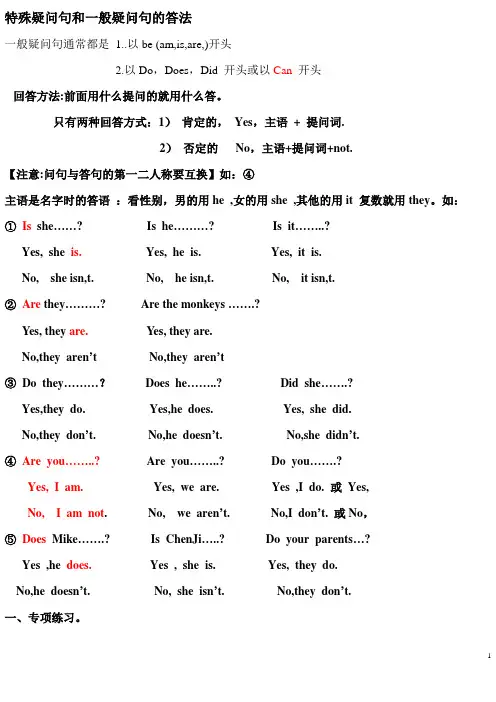
特殊疑问句和一般疑问句的答法一般疑问句通常都是1..以be (am,is,are,)开头2.以Do,Does,Did 开头或以Can开头回答方法:前面用什么提问的就用什么答。
只有两种回答方式:1)肯定的,Yes,主语+ 提问词.2)否定的No,主语+提问词+not.【注意:问句与答句的第一二人称要互换】如:④主语是名字时的答语:看性别,男的用he ,女的用she ,其他的用it 复数就用they。
如:①Is she……? Is he………? Is it……..?Yes, she is.Yes, he is. Yes, it is.No, she isn,t. No, he isn,t. No, it isn,t.②Are they………? Are the monkeys …….?Yes, they are.Yes, they are.No,they aren’t No,they aren’t③Do they………?Does he……..? Did she…….?Yes,they do. Yes,he does. Yes, she did.No,they don’t. No,he doesn’t. No,she didn’t.④Are you……..?Are you……..? Do you…….?Yes, I am.Yes, we are. Yes ,I do. 或Yes,No, I am not. No, we aren’t. No,I don’t. 或No,⑤Does Mike…….? Is ChenJi…..? Do your parents…?Yes ,he does.Yes , she is. Yes, they do.No,he doesn’t. No, she isn’t. No,they don’t.一、专项练习。
1. Did ChenJie read books yesterday?2. Can the girl cook the meals ?—————————————————————————————3.Is he going to swim this afternoon?4. Are they going to take a trip next weend? ————————————————————————————————5.Does he often go to school by bike ? 6. Do you play basketball every weekend? ———————————————————————————————————7. Did Mike do his homework yesterday? 8. Are they playing basketball now?————————————————————————————————一般疑问句及特殊疑问句的总结一般疑问句的定义:用yes或no来回答的疑问句叫一般疑问句。
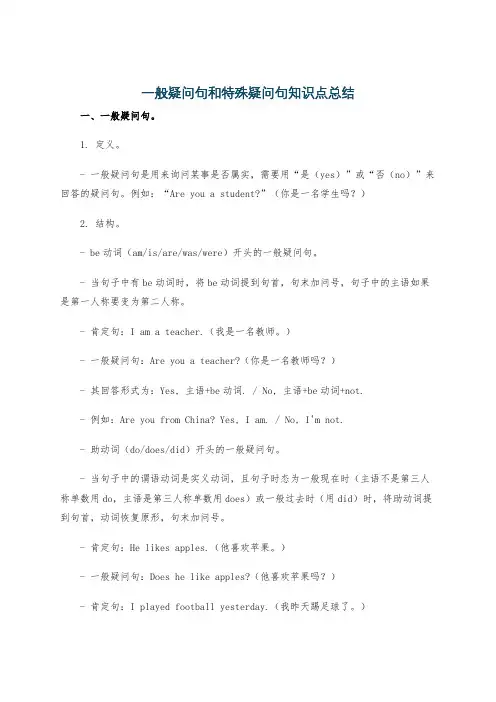
一般疑问句和特殊疑问句知识点总结一、一般疑问句。
1. 定义。
- 一般疑问句是用来询问某事是否属实,需要用“是(yes)”或“否(no)”来回答的疑问句。
例如:“Are you a student?”(你是一名学生吗?)2. 结构。
- be动词(am/is/are/was/were)开头的一般疑问句。
- 当句子中有be动词时,将be动词提到句首,句末加问号,句子中的主语如果是第一人称要变为第二人称。
- 肯定句:I am a teacher.(我是一名教师。
)- 一般疑问句:Are you a teacher?(你是一名教师吗?)- 其回答形式为:Yes, 主语+be动词. / No, 主语+be动词+not.- 例如:Are you from China? Yes, I am. / No, I'm not.- 助动词(do/does/did)开头的一般疑问句。
- 当句子中的谓语动词是实义动词,且句子时态为一般现在时(主语不是第三人称单数用do,主语是第三人称单数用does)或一般过去时(用did)时,将助动词提到句首,动词恢复原形,句末加问号。
- 肯定句:He likes apples.(他喜欢苹果。
)- 一般疑问句:Does he like apples?(他喜欢苹果吗?)- 肯定句:I played football yesterday.(我昨天踢足球了。
)- 一般疑问句:Did you play football yesterday?(你昨天踢足球了吗?)- 回答形式为:Yes, 主语+do/does/did. / No, 主语+don't/doesn't/didn't.- 例如:Do they go to school by bike? Yes, they do. / No, they don't.- 情态动词(can/could/may/must等)开头的一般疑问句。
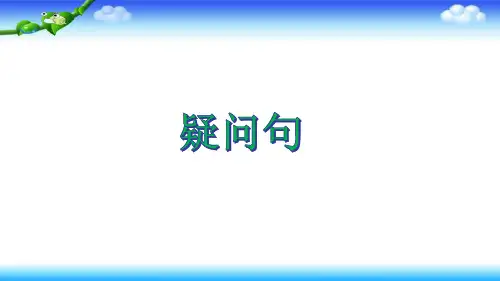
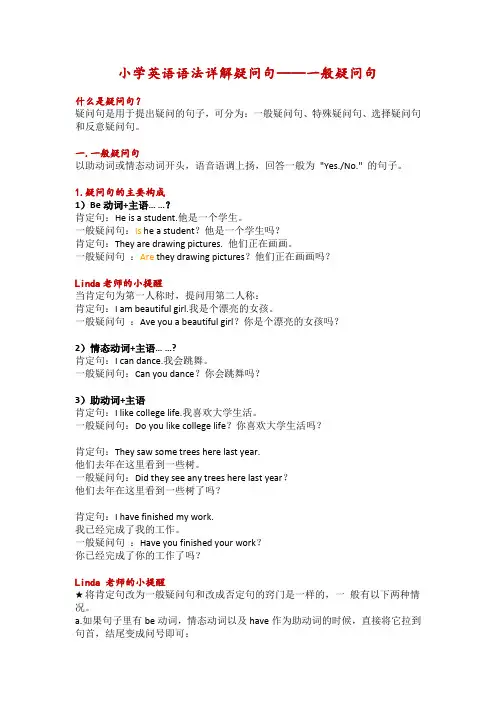
小学英语语法详解疑问句——一般疑问句什么是疑问句?疑问句是用于提出疑问的句子,可分为:一般疑问句、特殊疑问句、选择疑问句和反意疑问句。
一.一般疑问句以助动词或情态动词开头,语音语调上扬,回答一般为"Yes./No." 的句子。
1.疑问句的主要构成1)Be动词+主语… …?肯定句:He is a student.他是一个学生。
一般疑问句:Is he a student?他是一个学生吗?肯定句:They are drawing pictures. 他们正在画画。
一般疑问句:Are they drawing pictures?他们正在画画吗?Linda老师的小提醒当肯定句为第一人称时,提问用第二人称:肯定句:I am beautiful girl.我是个漂亮的女孩。
一般疑问句:Ave you a beautiful girl?你是个漂亮的女孩吗?2)情态动词+主语… …?肯定句:I can dance.我会跳舞。
一般疑问句:Can you dance?你会跳舞吗?3)助动词+主语肯定句:I like college life.我喜欢大学生活。
一般疑问句:Do you like college life?你喜欢大学生活吗?肯定句:They saw some trees here last year.他们去年在这里看到一些树。
一般疑问句:Did they see any trees here last year?他们去年在这里看到一些树了吗?肯定句:I have finished my work.我已经完成了我的工作。
一般疑问句:Have you finished your work?你已经完成了你的工作了吗?Linda 老师的小提醒★将肯定句改为一般疑问句和改成否定句的窍门是一样的,一般有以下两种情况。
a.如果句子里有be动词,情态动词以及have作为助动词的时候,直接将它拉到句首,结尾变成问号即可:He is twelve.→ Is he twelve?She can swim.→ Can she swim?I have got it.→ Have you got it?b.当句子里是实义动词时,我们也可以用一些小窍门:肯定句:I go to the park.我去公园。
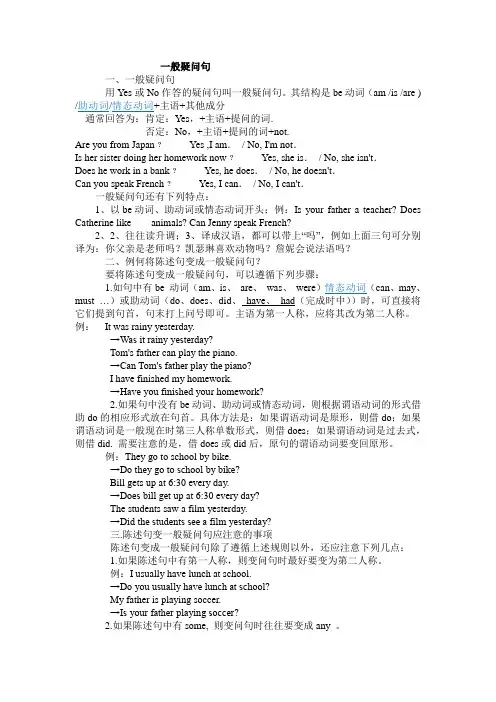
一般疑问句一、一般疑问句作答的疑问句叫一般疑问句。
其结构是be动词(am /is /are )主语+其他成分Yes,+主语+提问的词.否定:No,+主语+提问的词+not.Are you from Japan﹖Yes ,I am./ No, I'm not.Is her sister doing her homework now﹖Yes, she is./ No, she isn't.Does he work in a bank﹖Yes, he does./ No, he doesn't.Can you speak French﹖Yes, I can./ No, I can't.一般疑问句还有下列特点:1、以be动词、助动词或情态动词开头;例:Is your father a teacher? Does Catherine like animals? Can Jenny speak French?2、2、往往读升调;3、译成汉语,都可以带上“吗”,例如上面三句可分别译为:你父亲是老师吗?凯瑟琳喜欢动物吗?詹妮会说法语吗?二、例何将陈述句变成一般疑问句?1.如句中有be 动词(am、is、are、was、were can、may、must …)或助动词(do、does、did、have、had(完成时中)它们提到句首,句末打上问号即可。
主语为第一人称,应将其改为第二人称。
例:It was rainy yesterday.→Was it rainy yesterday?Tom's father can play the piano.→Can Tom's father play the piano?I have finished my homework.→Have you finished your homework?2.如果句中没有be动词、助动词或情态动词,则根据谓语动词的形式借助do的相应形式放在句首。
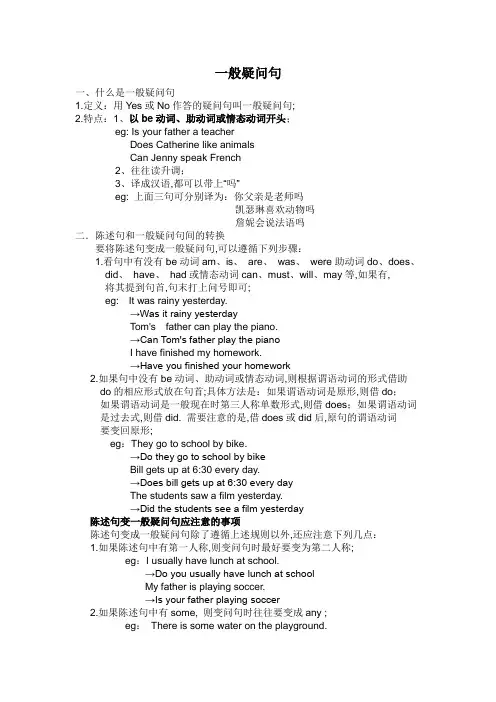
一般疑问句一、什么是一般疑问句1.定义:用Yes或No作答的疑问句叫一般疑问句;2.特点:1、以be动词、助动词或情态动词开头;eg: Is your father a teacherDoes Catherine like animalsCan Jenny speak French2、往往读升调;3、译成汉语,都可以带上“吗”eg: 上面三句可分别译为:你父亲是老师吗凯瑟琳喜欢动物吗詹妮会说法语吗二.陈述句和一般疑问句间的转换要将陈述句变成一般疑问句,可以遵循下列步骤:1.看句中有没有be动词am、is、are、was、were助动词do、does、did、have、had或情态动词can、must、will、may等,如果有,将其提到句首,句末打上问号即可;eg: It was rainy yesterday.→Was it rainy yesterdayTom's father can play the piano.→Can Tom's father play the pianoI have finished my homework.→Have you finished your homework2.如果句中没有be动词、助动词或情态动词,则根据谓语动词的形式借助do的相应形式放在句首;具体方法是:如果谓语动词是原形,则借do;如果谓语动词是一般现在时第三人称单数形式,则借does;如果谓语动词是过去式,则借did. 需要注意的是,借does或did后,原句的谓语动词要变回原形;eg:They go to school by bike.→Do they go to school by bikeBill gets up at 6:30 every day.→Does bill gets up at 6:30 every dayThe students saw a film yesterday.→Did the students see a film yesterday陈述句变一般疑问句应注意的事项陈述句变成一般疑问句除了遵循上述规则以外,还应注意下列几点:1.如果陈述句中有第一人称,则变问句时最好要变为第二人称;eg:I usually have lunch at school.→Do you usually have lunch at schoolMy father is playing soccer.→Is your father playing soccer2.如果陈述句中有some, 则变问句时往往要变成any ;eg:There is some water on the playground.→Is there any water on the playground3.复合句变一般疑问句通常只变主句,从句不变;eg:I know he comes from Canada.→Do you know he comes from Canada三.一般疑问句往往采用简短回答由三部分三个单词组成,对这三部分三个单词的确定可以概括例下:1.第一个词:不是Yes就是No;有时根据语气的不同,Yes可由Sure, Certainly, Of course等代替.NO可由sorry 代替.2.第二个词:问谁答谁;即答语中的主语须与问句的主语一致但必须用主格代词;eg:Does she clean her room every day Yes, she does.Is Anna′s father a doctor No,he isn′t.如果主语是this that,回答时用it 代替,如果问句中主语these, those, 回答时用they′ 代替;3.第三个词:用什么问,用什么答;即沿用问句中的引导词;Can Jim play soccer Yes, he can.Does Mr Bean speak English Yes, he does.需要注意问题:1.用may 引导的问句,肯定回答用may,否定回答用can′t 或mustn′t用must 引导的问句,肯定回答用must,否定回答用needn′t.eg:May I go to the park nowYes, you may. /No, you mustn′t.Must I wash my clothes nowYes, you must. /No, you needn′t.4.用No开头作否定回答时,结尾要加上not;因为回答必须是三部分, 所以否定回答必须缩写,而肯定回答不能缩写;eg:Did Thomas come here yesterdayYes, he did./ N o ,he didn′t.Is Lin Lin in Class 3Yes, she is. / No, she isn′t.或No, she′s not.一般疑问句练习题1. His father is an English teacher.2. These cats are crying.3. They can swim.4. I like to read English.5. I go to school on foot.6. He likes English.7. His father goes to work by bus.8. He is crying under the tree.9. His birthday is on the twentieth of November.10. Mrs. Li and Kitty are in a big shop.11. Kitty is wearing her new uniform.12. The boy under the tree is hungry.13. He goes to school every day.15. I want to have a model car.16. She wants a cup of coffee.17. Mrs. Li and Kitty watch television at night.18. I do my homework after school.特殊疑问句一. 定义:以疑问词开头,对句中某一成分提问的句子叫特殊疑问句;常用的疑问词有:what, what color, what nationality, what day, who 二.构成①特殊疑问词+助动词+主语+动词原形+其他eg:Where do you do study English②特殊疑问词+be动词+主语+其他eg:Why is your Mum so angry③特殊疑问词+情态动词+主语+动词原形+其他eg:What can I do for you三.回答特殊疑问句时,不能用yes /no,即问什么答什么,尤其是简略回答;如:-Who is from Canada﹖-Helen is.- Where's the restaurant﹖- Near the station.-Why do you like koalas﹖-Because they are cute.单词意思用法when什么时间问时间who谁问人whose谁的问主人where在哪里问地点which哪一个问选择why为什么问原因what什么问东西what time什么时间问时间what colour什么颜色问颜色what about…怎么样问意见what day星期几问星期what date什么日期问具体日期what for为何目的问目的how…怎么样问情况how old多大问年龄how many多少问数量how much多少问价钱how about…怎么样问意见how far多远问路程特殊疑问句练习题一1._____ is that pretty girl She is my sister.2.._____ are Jack and Tom They are behind you.do you go to school I go to school from Monday to Friday.has a beautiful flower John has a beautiful flower.are they They are my parents.is my mother She is in the living room.are you going We are going to the bakery面包坊.do Jim and Wendy play ball They play ball in the afternoon.does he jog He jogs in the park.are you from I'm from Changchun city.1、A: _______ is the boy in blueB:He’s Mike.2、A: _______ wallet is it B:It’s mine.3、A: _______ is the diary B:It’s under the chair.4、A: _______ is the Chirstmas Day B: It’s on the 25th of December.5、A: _______ are the earphonesB:They are 25 yuan.6、A: _______ is the hairdryerB:It’s blue.7、A: _______ is it todayB:It’s Sunday.8、A: _______ was it yesterday B: It was the 13th of October.9、A: _______ this red oneB:It’s beautiful.10、A: _______ is it from here B:It’s about two kilometre away.11、A: Can I have some paper and some crayonsB: _______ A: I want to make a kite.12、A:_______ one is fatter, the blue one or the red one B: The blue one.13、A:_______ is your cousinB: He’s 15 years old.14、A:_______ do you have dinner B: At 6 o’clock.二、就画线部分提问is my father.are under the tree.often watch TV after dinner.晚饭后提示:饭后强调的是时间问题; swims in the swimming pool.游泳池flies in the sky.often brush my teeth in the evening.likes to play with Bill.'s father plays badminton羽毛球every weekend.supermarket is near the school.laptop笔记本电脑is on the table.has a pair of earrings耳环.flowers are in the flower pot花盆.grandpa took us to the zoo.put the gold fish金鱼into the fish tank鱼缸.monkey sleeps at night.。
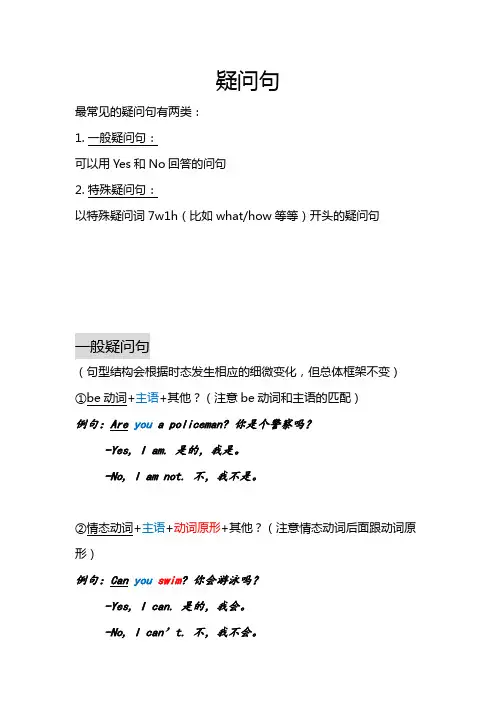
疑问句最常见的疑问句有两类:1.一般疑问句:可以用Yes和No回答的问句2.特殊疑问句:以特殊疑问词7w1h(比如what/how等等)开头的疑问句一般疑问句(句型结构会根据时态发生相应的细微变化,但总体框架不变)①be动词+主语+其他?(注意be动词和主语的匹配)例句:Are you a policeman? 你是个警察吗?-Yes, I am. 是的,我是。
-No, I am not. 不,我不是。
②情态动词+主语+动词原形+其他?(注意情态动词后面跟动词原形)例句:Can you swim? 你会游泳吗?-Yes, I can. 是的,我会。
-No, I can’t. 不,我不会。
③助动词+主语+动词原形+其他?(注意助动词和主语的匹配)例句:Do you like dancing? 你喜欢跳舞吗?-Yes, I do. 是的,我喜欢。
-No, I don’t. 不,我不喜欢。
Do you go to school every day? 你每天去学校吗?做句型转换的方法(如何将陈述句变成一般疑问句):先看句子中是否有be动词或者情态动词A.如果有be动词或者情态动词,对照一般疑问句句型①/②将be动词或者情态动词提到句首,其他部分依次照抄B.如果没有be动词或者情态动词,对照一般疑问句句型③句首+助动词(注意是否要和主语匹配变化),其他部分依次照抄,注意原来的动词要变为原形#无论是哪一种情况,都要注意第一人称要变成第二人称,第二人称要变成第一人称(you和I的切换)特殊疑问句(句型结构会根据时态发生相应的细微变化,但总体框架不变)①特殊疑问词(作主语)+谓语+其他?(陈述句语序)例句:Who is reading a book? 谁正在读书?Which is the biggest? 哪个是最大的?Who likes dancing? 谁喜欢跳舞?②特殊疑问词(作主语修饰语)+主语+谓语+其他?(陈述句语序)例句:Whose bag is red? 谁的包是红色的?How many people work in the school?有多少人在学校工作?③特殊疑问词+一般疑问句(详见上面的一般疑问句结构)?(此情况为当特殊疑问词代替的部分不是主语或者主语修饰语时)例句:What are you doing? 你在做什么?What colour do you like? 你喜欢什么颜色?做句型转换的方法(如何将句子转变成特殊疑问句):先看划线部分是否为句子中的主语或者主语修饰语A.如果是主语,对照特殊疑问句句型①划线部分用特殊疑问词代替,其他部分照抄(该疑问句为陈述句语序)B.如果是主语修饰语,对照特殊疑问句句型②划线部分用特殊疑问词代替,其他部分照抄(该疑问句为陈述句语序)C.如果不是主语或者主语修饰语,对照特殊疑问句句型③先将原来的陈述句变成一般疑问句(如果本来就是一般疑问句就不需要再做修改)划线部分用特殊疑问词代替再将特殊疑问词提前到句首#如果划线部分是动词或者动词短语,表示做什么事,那变为特殊疑问词的时候要用do what 代替特殊疑问词主要分为两类:wh- (wh开头的疑问词)和how - (how开头的疑问词)How often:多长时间一次,问频率。
五年级英语一般疑问句和特殊疑问句知识精讲英语一般疑问句和特殊疑问句知识精讲一、一般疑问:1.含系动词be的一般疑问句的构成具体地说,am 只能跟在第一人称的单数 I 后面,are 搭配 you,is 跟在第三人称单数 he, she 后面.be 动词的基本意思:是.I'm in Class 2, Grade 1. →Are you in Class 2, Grade 1? 你是在一年级二班吗?(如遇第一人称,最好将其置换成第二人称)It's a map of China. →Is it a map of China? 这是一幅中国地图吗?Am I wrong again? (我又错了?)Yes, you are (wrong again). (是的,你又错了。
)No, you aren’t. (不,你没错。
)Is it your bicycle? (这辆自行车是你的吗?)Yes, it is. (是的,是我的。
)No, it isn’t. (不,那不是我的。
)2.含情态动词的一般疑问句的构成一般疑问句面前人人平等:情态动词与am / is / are一样,也可直接将它们提至主语前,所以问题迎刃而解了。
如:I can spell it. →Can you spell it? 你会拼写它吗?Shall I call a taxi for you ? (需要我替你叫一辆出租车吗?)Yes, please. Thank you. (好的,谢谢你。
) No, thank you.(不必了,谢谢你。
)Will you do that for her? (你愿意替她做那件事吗?)Yes, I will.(是的,我愿意。
)No, I won’t.(不,我不愿意。
)Can she drive? (她会开车吗?)Yes, she can.(是的,她会。
)No, she can’t.(不,她不会。
)3.含实义动词的一般疑问句的构成含实义动词的一般疑问句的构成稍微有点讲究,要在句首加do;如逢主语为第三人称单数,要在句首加does,并要将谓语动词变回原形(如has→have,likes→like等);有时陈述句中的some还要变作any等。
人教版小学四年级英语下册一般疑问句和特殊疑问句知识精讲Document serial number【UU89WT-UU98YT-UU8CB-UUUT-UUT108】PEP小学四年级英语下册《一般疑问句和特殊疑问句知识精讲》(一)疑问句可再分为一般疑问和特殊疑问两种。
(一).一般疑问:用be或助动词或情态动词置于句首,并以肯定回答“Yes,…”,或否定回答“No,…”或相当于yes / no回答的问句称为一般疑问句.1. 含系动词be的一般疑问句的构成具体地说,am 只能跟在第一人称的单数 I 后面,are 搭配 you ,we ,they等, ,is 跟在第三人称单数 he, she ,it后面,而be 动词的基本意思:是如:This is my computer. →Is this your computer (如遇第一人称,最好将其置换成第二人称,即将“我的”要换成“你的”) It's a map. →Is it a map而对于一般疑问句和特殊疑问句的回答分为两种,即肯定回答和否定回答。
如:Is it your bike肯定回答:Yes, it is.否定回答:No, it isn’t.Are they your shoes肯定回答:Yes, they are.否定回答:No, they are n’t.2.含助动词Do或Does的一般疑问句的构成Do与you,I,we连用,Does与he,she和it连用。
如:Do you have lunch at school肯定回答:Yes, I do.否定回答:No, I don’t.3. 含情态动词的一般疑问句的构成一般疑问句面前人人平等:情态动词与am / is / are一样,也可直接将它们提至主语前,所以问题迎刃而解了。
如:I can do it. →Can you do it肯定回答:Yes,I can.否定回答:No, I can’t.(记住在改成一般疑问句时应该将第一人称改成第二人称)Can I wear my new shirt today肯定回答:Yes,you can.否定回答:No, you can’t.4. 小插曲:一般疑问句的语调大部分的一般疑问句都应读作升调(↗),并落在最后一个单词身上。
小学英语一般疑问句和特殊疑问句总结小学语法之疑问句一、一般疑问句一般疑问句是指可以用Yes或No作答的疑问句。
这种疑问句通常以be动词、助动词或情态动词开头,句末读升调。
肯定陈述句可以通过两种方式变成一般疑问句。
首先,如果原句中有be动词或情态动词,将其提到句首,句末加问号即可。
其次,如果原句中没有be动词或情态动词,需要在主语前加助动词(一般现在时do、does、一般过去时did),并将谓语动词变回原形。
需要注意的是,如果陈述句中有第一人称,则变问句时要变为第二人称。
另外,如果陈述句中有some,则变问句时往往要变成any。
一般疑问句的回答可以用Yes或No,并在主语后加上相应的be动词、助动词或情态动词。
如果回答是否定的,则需要在be动词、助动词或情态动词后面加上not的否定形式缩写。
Can she dance。
Yes。
she can.When asked if she can dance。
XXX。
If the subject of the n is "this" or "that"。
the answer should use "it" instead。
If the subject is "these" or "those"。
the answer should use "they" instead.Is this your bag?Yes。
it is。
/ No。
it isn't.Are those your books?Yes。
they are。
/ No。
they aren't.Practice:1.What did his father do for a living?2.Why are these cats crying?3.Who can swim?4.How did you go to school?5.How does his XXX work?6.Can Mrs。
特殊疑问句和一般疑问句的答法一般疑问句通常都是1..以be (am,is,are,)开头2.以Do,Does,Did 开头或以Can开头回答方法:前面用什么提问的就用什么答。
只有两种回答方式:1)肯定的,Yes,主语+ 提问词.2)否定的No,主语+提问词+not.【注意:问句与答句的第一二人称要互换】如:④主语是名字时的答语:看性别,男的用he ,女的用she ,其他的用it 复数就用they。
如:①Is she……? Is he………? Is it……..?Yes, she is.Yes, he is. Yes, it is.No, she isn,t. No, he isn,t. No, it isn,t.②Are they………? Are the monkeys …….?Yes, they are.Yes, they are.No,they aren’t No,they aren’t③Do they………?Does he……..? Did she…….?Yes,they do. Yes,he does. Yes, she did.No,they don’t. No,he doesn’t. No,she didn’t.④Are you……..?Are you……..? Do you…….?Yes, I am.Yes, we are. Yes ,I do. 或Yes,No, I am not. No, we aren’t. No,I don’t. 或No,⑤Does Mike…….? Is ChenJi…..? Do your parents…?Yes ,he does.Yes , she is. Yes, they do.No,he doesn’t. No, she isn’t. No,they don’t.一、专项练习。
1. Did ChenJie read books yesterday?2. Can the girl cook the meals ? —————————————————————————————3.Is he going to swim this afternoon?4. Are they going to take a trip next weend? ————————————————————————————————5.Does he often go to school by bike ? 6. Do you play basketball every weekend? ———————————————————————————————————7. Did Mike do his homework yesterday? 8. Are they playing basketball now? ————————————————————————————————一般疑问句及特殊疑问句的总结一般疑问句的定义:用yes或no来回答的疑问句叫一般疑问句。
一般疑问句和特殊疑问句知识精讲Company number:【WTUT-WT88Y-W8BBGB-BWYTT-19998】英语一般疑问句和特殊疑问句知识精讲疑问句可再分为一般疑问(General question)和特殊疑问(Special question)两种。
1.一般疑问:用be或助动词或情态动词置于句首,并以“Yes,…”,或“No,…”或相当于yes / no回答的问句称为一般疑问句.2. 含系动词be的一般疑问句的构成具体地说,am 只能跟在第一人称的单数 I 后面,are 搭配 you, 不管是单数还是复数,is 跟在第三人称单数 he, she 后面,be 动词的基本意思:是如:I'm in Class 2, Grade 1. →Are you in Class 2, Grade 1 你是在一年级二班吗(如遇第一人称,最好将其置换成第二人称)It's a map of China. →Is it a map of China 这是一幅中国地图吗be 或 have(有)置于句首来表达疑问,例:Am I wrong again (我又错了)Yes, you are (wrong again). (是的,你又错了。
)No, you aren’t. (不,你没错。
)Is it your bicycle (这辆自行车是你的吗)Yes, it is. (是的,是我的。
)No, it isn’t. (不,那不是我的。
)Were there many people at her birthday party(她的生日宴会来了很多人吗)Yes, there were. (是的,来了很多人。
)No, there weren’t. (没有,没有很多人。
)Have you money with you (你身上带钱了吗)(=Do you have money with you—美语)Yes, I have.(Yes, I do.—美语)(有,我带钱了。
英语一般疑问句和特殊疑问句知识精讲疑问句可再分为一般疑问(General question)和特殊疑问(Special question)两种。
1.一般疑问:用be或助动词或情态动词置于句首,并以“Yes,…”,或“No,…”或相当于yes / no回答的问句称为一般疑问句.2.含系动词be的一般疑问句的构成具体地说,am 只能跟在第一人称的单数I 后面,are 搭配you, 不管是单数还是复数,is 跟在第三人称单数he, she 后面,be 动词的基本意思:是如:I'm in Class 2, Grade 1. →Are you in Class 2, Grade 1 你是在一年级二班吗(如遇第一人称,最好将其置换成第二人称)It's a map of China. →Is it a map of China 这是一幅中国地图吗^be 或have(有)置于句首来表达疑问,例:Am I wrong again (我又错了)Yes, you are (wrong again). (是的,你又错了。
)No, you aren’t. (不,你没错。
)Is it your bicycle (这辆自行车是你的吗)Yes, it is. (是的,是我的。
)No, it isn’t. (不,那不是我的。
),Were there many people at her birthday party(她的生日宴会来了很多人吗)Yes, there were. (是的,来了很多人。
)No, there weren’t. (没有,没有很多人。
)Have you money with you (你身上带钱了吗)(=Do you have money with you—美语)【Yes, I have.(Yes, I do.—美语)(有,我带钱了。
)No, I have no money with me. (No, I don’t.—美语)(没有,我没带钱。
)3.含情态动词的一般疑问句的构成一般疑问句面前人人平等:情态动词与am / is / are一样,也可直接将它们提至主语前,所以问题迎刃而解了。
如:I can spell it. →Can you spell it 你会拼写它吗Shall I call a taxi for you (需要我替你叫一辆出租车吗)Yes, please. Thank you. (好的,谢谢你。
)No, thank you.(不必了,谢谢你。
))Will you do that for her (你愿意替她做那件事吗)Yes, I will.(是的,我愿意。
)No, I won’t.(不,我不愿意。
)Can she drive (她会开车吗)Yes, she can.(是的,她会。
)No, she can’t.(不,她不会。
)4.含实义动词的一般疑问句的构成含实义动词的一般疑问句的构成稍微有点讲究,要在句首加do;如逢主语为第三人称单数,谓语动词为一般现在时单数第三人称形式'"v-(e)s"时,用does,并要将谓语动词变回原形(如has→have,likes→like等);有时陈述句中的some还要变作any等。
如:She lives in Beijing. →Does she live in Beijing 她住在北京吗I like English. →Do you like English 你喜欢英语吗There are some books on my desk.→Are there any books on your deskDo you speak Japanese (你会说日语吗)Yes, I do.(是的,我会说。
)No, I don’t.(不,我不会说。
)\Does she swim very well(她游泳游得好吗)Yes, she does. She is a good swimmer.(是的,她游得好。
她是游泳高手。
)No, she doesn’t. She doesn’t swim at all.(不,她不会。
她根本不会游泳。
)Did you tell her the truth (你向她说了实话吗)Yes, I did.(是的,我说了。
){No, I didn’t.(不,我没说。
)Don’t you like to have a cup of coffee(你不喜欢喝一杯咖啡吗)Yes, I do.(要,我要一杯。
)No, I don’t. Thank you. (不,我不要。
谢谢你。
)依循否定疑问要表达否定答案时,中文的习惯是“是的,……不……(或没有……)”,但是英语应为“No,…not.”,不可如中文说成“Yes,…not.”。
5.少数口语化的一般疑问句,如问一个与前文相同的问句时,可省略成"And you"或"What / How about..."等;甚至只抓关键词,读作升调。
如:Your pen 你的钢笔6.小插曲:一般疑问句的语调大部分的一般疑问句都应读作升调(↗),并落在最后一个单词身上。
如:Is it a Chinese car↗Do you have questions↗Have you ever been to China before↗Don’t you think it is a good idea↗7. 一般疑问句的应答;用yes / no(或相当于yes / no的词)回答,并怎么问怎么答(句首为情态动词/am / is / are还是do /does),简略回答时要注意缩写(否定的n't)和采用相应的人称代词以避免重复:即"Yes,主语(代词)+情态动词或am / is / are或do / does."表示肯定;"No,主语(代词)+情态动词或am / is / are或者do / does not(n't)."表示否定。
回答要完整,如:①-Is Mary a Japanese girl 玛丽是日本女孩吗-Yes, she is. / No, she isn't. 是的,她是。
/不,她不是。
②-Can Lily speak Chinese 莉莉会说中国话吗-No, she can't. / Sorry, I don't know. 不,她不会。
/对不起,我不知道。
③-Do you like English 你喜欢英语吗-Yes, very much. 是的,非常喜欢。
II. 特殊疑问句:1.定义以特殊疑问词开头,对陈述句中的某一部分提出疑问/ 进行发问,回答时针对问句中的代词和副词来回答,不用yes或no,的句子叫特殊疑问句。
2.特殊疑问词全搜索一句话:wh-开头外加能与之结伴同行的名词;how及它的形容词兄弟姐妹们,即如:what,where,which,what class,what time,what number;who, whom, whose,how,how many,how old,how much等。
无论是做疑问代词还是限定词,which 和what 所指的范围不同。
what所指的范围是无限的,而which则指在一定的范围内,例如:Which girls do you like best 你喜欢哪几个姑娘What girls do you like best 你喜欢什么样的姑娘Which do you prefer, coffee or tea 咖啡和茶,你喜欢喝哪种;What do you usually drink before dinner 你饭前通常喝什么Whom是who的宾格,在书面语中,它作动词宾语或介词宾语,在口语中作宾语时,可用who 代替,但在介词后只能用whom, 例如:Who(m) did you meet on the street你在街上遇到了谁(作动词宾语)Who(m) are you taking the book to你要把这书带给谁(作介词宾语,置句首)To whom did you speak on the campus你在校园里和谁讲话了(作介词宾语,置介词后,不能用who取代)3. 特殊疑问句的构成特殊疑问句由"特殊疑问词+一般疑问句"构成:How old are you 你多大了What's this in English 这个用英语怎么讲;但特殊疑问句有时也要"特殊解":即如果问的是主语或主语的定语时,这时的特殊疑问句看起来成了"特殊疑问词(+主语)+陈述句"。
如:Who's not here today 今天谁没来·Which pen is red 哪枝钢笔是红色的4.特殊疑问句的语调小插件一般说来,特殊疑问句都要读成降调(↘),并往往让最后一个单词承担此重任。
如:What row are you in(↘) 你在第几排Where is"E" (↘) "E"在哪里5.对特殊疑问句的答复小扫描)疑问代词用于特殊疑问句中,疑问代词一般都放在句首,并在句中作为某一句子成分。
如:What is this (what作表语)这是什么what color is it 什么颜色Which is bigger, the left one or the right one (which作主语)哪一个大一点,左边的一个还是右边的一个What are you talking about (what作宾语)你在说什么Who will go with you (who作主语)谁和你一起去Whom are you talking to (whom作宾语)你在跟谁说话Whose dictionary is this (whose作定语)这是谁的字典;What's the capital of your country 贵国首都是哪儿What's your motherland 你祖国是哪儿回答特殊疑问句,不能用"yes / no";但可用"到什么山上唱什么歌"来形容对特殊疑问句的应答- -即问什么答什么(尤其是简略回答更明显)。
如:-How old is your sister 你妹妹今年多大了-She's only five. / Only five. (她)才5岁。
对指物名词或谓语动词提出疑问,疑问词用what询问天气。